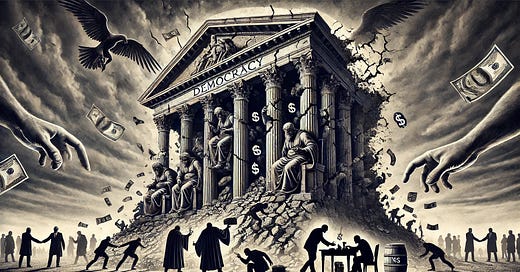Democracy Under Threat: How Manipulations by the Powerful Undermine the Foundations of Freedom in Ukraine
In recent public discourse, there has been deep concern over the rhetoric demonstrated by certain representatives of Ukraine’s ruling elite. Statements equating Ukraine to a sort of "concentration camp" not only cause a stir but also call into question their alignment with democratic principles. This raises the question: why do those in power allow themselves such rhetoric, which is, without exaggeration, a direct challenge to the foundations of democracy? Why is society forced to hear declarations that, to put it mildly, provoke reactions far removed from calm discussion?
Since the start of the full-scale Russian invasion, national security has become a key instrument for justifying many government decisions and actions. However, this tool is increasingly being turned into a means of manipulation, where any accusation of corruption or negligence by officials is declared a threat to state security. This trend, apart from political risks, also has societal consequences: the erosion of trust in the government and the degradation of democratic institutions.
The Erosion of Democratic Values
Every day, we witness the gradual undermining of fundamental principles of democratic society — freedom of speech, the presumption of innocence, the right to privacy — all under the guise of "defending national interests." Notable examples include:
Freedom of speech: It is increasingly portrayed as a threat. For instance, criticism of the government’s actions or exposure of corruption is not regarded as socially beneficial but as an attempt to "destabilize the state." Yet, what could be a greater threat than suppressing the truth?
Banking secrecy: This is depicted as a tool for "protecting criminals," ignoring that it is an integral part of citizens' right to privacy.
Presumption of innocence: In today’s context, this is no longer a fundamental principle of justice but an "obstacle" to combating crime.
Right to assembly: Protests are increasingly viewed as a "threat to public order," and the government seeks to limit this mechanism of societal influence.
Risks of Power Centralization
The usurpation of power under the guise of fighting for stability increasingly resembles authoritarian practices. For example, the division of powers is dismissed as a "bureaucratic hindrance," which becomes a pretext for centralizing authority. This is a direct path to dismantling the system of checks and balances, without which democracy becomes a mere facade.
Lessons from History
Let us look at examples of totalitarian regimes where human rights were sacrificed for the sake of a "greater goal." As a result, societies deprived of democratic mechanisms lost control over their governments, while the ruling elite transformed into a closed caste, shielded by security forces and laws crafted for their benefit.
Today, more than ever, it is crucial not to remain indifferent to such trends. Democracy is neither a gift nor a legacy; it is a system of values that must be defended daily. Losing rights and freedoms is not only a return to the past but also the creation of real prerequisites for establishing a dictatorship. Society must become an active defender of its rights, preventing manipulations from destroying the foundations of democracy.
The future of Ukraine depends on whether civil society can resist these dangerous tendencies. Otherwise, the next step could be not only the restriction of rights but also the complete loss of the ability to restore them.



